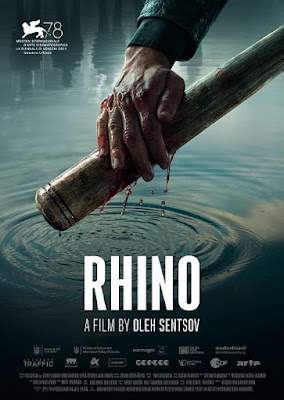Among gangster films, this one is unusual, because almost none of its characters went to prison, but the director did. His crime was being Ukrainian in Crimea, which is weird, considering all decent countries recognize Crimea as part of Ukraine. Tragically, Putin saw it differently. Sentsov’s 2015-2019 stint in a Russian prison earned the director the Sakharov Award from the European parliament. Today, the film’s leading man is fighting for his country on the frontlines. Obviously, the current Ukrainian government has an antagonistic relationship with Russia, but that was much less so during the lawless 1990s, when Sentsov’s film is set. Life is hard and so is our protagonist’s head in Sentsov’s Rhino: Ukrainian Godfather, which releases this Friday.
There was a time when Rhino was a bullied little boy named Vova. However, the older he got, the tougher he had to be. His upbringing under his alcoholic father was not easy, as we see in an absolutely amazing time-lapse tracking shot that must quite a challenge to set-up. At first, Vova was just a street thug, but when he tangles with the wrong mobbed-up gym, he enlists with a rival gang for protection.
While his nickname is initially a source of embarrassment, its brutish implications are helpful to his reputation. After a period of slow but steady advancement, Rhino starts to make some aggressive moves of his own, which have violent consequences. In fact, he will regret many of his life choices, as the older, world-weary gangster confides to his mysterious companion, during the looking-back-in-retrospect flashforwards.
Rhino is too naturalistic to be a proper slam-bang gangster movie, but it is also much more violent and plot-driven than the average art-house social issue film. It very definitely tries to capture the vibe of 1990s that cause the disillusionment that contributed to the troubles of the 2000s. Had this period been more stable and transparent, it is less likely a Russian-aligned thug like Yanukovych could have risen to power. Indeed, this film is absolutely marinated in regret, on both the individual and collective levels.
In addition to a patriot, Serhii Filimonov is also a magnetic screen presence. His character is animalistic and brooding, but his physical performance is still quite expressive. In contrast, Yevhen Grygoriev is a nervy livewire, as Plus, his duplicitous sidekick.
Rhino is a good, but not great film, because so much of it is rather predictable. However, it clearly establishes Sentsov a massively talented filmmaker with the potential for greatness, even more than his debut feature, Gaamer. There is some great cinema in here, from a filmmaker who deserves international support and attention. Strongly recommended for those who can appreciate its gritty realism, Rhino: Ukrainian Godfather releases tomorrow (3/24).

